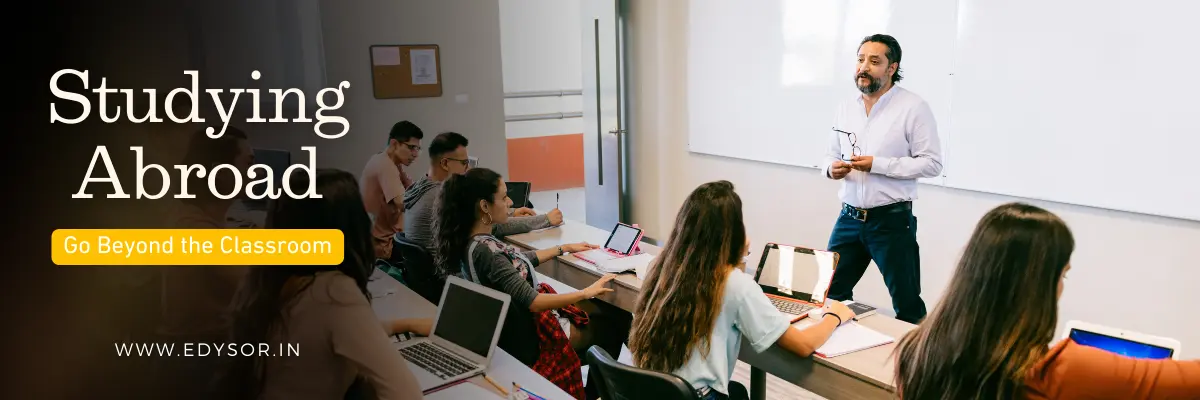13 May 2024 | Studying Abroad That Extend Far Beyond Academic Learning
0
165
Benefits of Studying Abroad That Go Beyond the Classroom
Studying abroad offers a plethora of benefits that extend far beyond the confines of the classroom. While academics play a crucial role, the experience encompasses personal growth, cultural immersion, and career advancement. In this article, we delve into the multifaceted advantages of studying abroad, shedding light on how it shapes individuals into global citizens.
Personal Growth and Independence
Studying abroad fosters unparalleled personal growth. Away from familiar surroundings, students are compelled to step out of their comfort zones, confront challenges, and adapt to new environments. This process cultivates resilience, self-reliance, and a heightened sense of independence. From navigating public transportation systems to managing finances, students develop invaluable life skills that transcend academia.
Immersion in a New Culture: Studying abroad immerses individuals in diverse cultures, fostering cross-cultural understanding and appreciation. Interacting with locals, sampling exotic cuisines, and participating in cultural festivities enriches one's perspective, broadening horizons beyond borders.
Language Proficiency: For those studying in non-native language environments, language proficiency is a natural byproduct. Daily interactions necessitate linguistic adaptation, leading to fluency and confidence in communication. Mastering a new language opens doors to international opportunities and enhances employability in an increasingly globalized world.
Expanded Network: Studying abroad facilitates the formation of a global network comprising peers, professors, and professionals from diverse backgrounds. These connections not only enrich academic discourse but also present opportunities for collaboration, mentorship, and lifelong friendships.
Academic Enrichment and Professional Development
While personal growth is a cornerstone of studying abroad, academic enrichment and professional development are equally significant. Institutions worldwide offer unique programs, cutting-edge research opportunities, and access to esteemed faculty, enriching the academic experience.
Diverse Learning Environments: Studying abroad exposes students to diverse pedagogical approaches, fostering critical thinking, and broadening intellectual horizons. Experiencing different teaching methods, perspectives, and academic disciplines cultivates adaptability and innovation, enhancing academic prowess.
Research and Internship Opportunities: Many study abroad programs incorporate research projects, internships, or fieldwork, providing hands-on experience in various industries. Engaging in real-world applications of theoretical knowledge equips students with practical skills and enhances their employability upon graduation.
Global Perspective: Exposure to international perspectives fosters a global mindset, essential for success in today's interconnected world. Understanding socio-cultural nuances, economic trends, and geopolitical dynamics enriches academic discourse and prepares students to tackle global challenges.
Career Advancement and Global Citizenship
Studying abroad is a catalyst for career advancement and the cultivation of global citizenship, positioning individuals as adaptable, culturally competent professionals in a competitive job market.
Enhanced Employability: Employers value the skills acquired through studying abroad, such as adaptability, cultural sensitivity, and language proficiency. Graduates with international experience are sought after for their ability to navigate diverse environments, communicate effectively across cultures, and contribute innovative perspectives to global teams.
Intercultural Competence: Studying abroad nurtures intercultural competence, a crucial attribute in today's multicultural workplaces. Exposure to diverse perspectives fosters empathy, respect, and collaboration across cultural boundaries, essential for building inclusive, high-performing teams.
Global Citizenship: Beyond academic and professional gains, studying abroad instills a sense of global citizenship, inspiring individuals to act as responsible stewards of our interconnected world. Engaging in community service, sustainability initiatives, or cultural exchange programs fosters empathy, solidarity, and a commitment to positive global change.
The benefits of studying abroad transcend academic achievement, encompassing personal growth, cultural immersion, and career advancement. By embracing new experiences, cultivating intercultural competence, and fostering a global mindset, students emerge as empowered individuals ready to navigate an increasingly interconnected world. As the adage goes, "The world is a book, and those who do not travel read only one page." Studying abroad opens doors to endless possibilities, shaping the leaders, innovators, and global citizens of tomorrow.
For more assistance, please visit our study abroad consultancy services and explore our wide range of offerings for students interested in studying in the USA, studying in the UK, studying in Canada, studying in Australia, studying in Ireland, and many other countries.
Frequently Asked Questions
1. Why should I consider studying abroad?
Studying abroad offers a unique opportunity for personal growth, academic enrichment, and cultural immersion. It allows you to step out of your comfort zone, experience new cultures, and develop valuable skills such as independence, adaptability, and intercultural competence. Additionally, studying abroad enhances your academic and professional prospects, opening doors to international opportunities and broadening your global network.
2. How do I choose the right study abroad program?
When selecting a study abroad program, consider factors such as academic offerings, location, language of instruction, cultural immersion opportunities, and support services provided by the host institution. Research different programs, consult with academic advisors, alumni, and study abroad offices, and carefully assess your personal and academic goals to find the program that best aligns with your interests and aspirations.
3. What financial resources are available for studying abroad?
Financing a study abroad experience can seem daunting, but there are various financial resources available to help offset costs. These may include scholarships, grants, financial aid, study abroad grants from universities or organizations, and part-time employment opportunities while studying abroad. Additionally, exploring cost-effective destinations, budgeting wisely, and seeking guidance from financial aid offices can help make studying abroad more affordable.
4. Will studying abroad delay my graduation or academic progress?
While studying abroad may require careful planning to ensure academic progress, it does not necessarily have to delay your graduation. Many study abroad programs offer courses that fulfill degree requirements, and academic advisors can help you create a study plan that aligns with your academic goals and ensures timely graduation. Additionally, consider summer or semester-long programs that complement your academic curriculum without extending your time to graduation.
5. How can I make the most of my study abroad experience?
To maximize your study abroad experience, embrace the opportunity for cultural immersion, engage with local communities, and participate in extracurricular activities and cultural events. Step out of your comfort zone, try new foods, learn the local language, and explore the host country's landmarks and attractions. Build meaningful relationships with peers, professors, and locals, and take advantage of academic and professional opportunities such as internships, research projects, and volunteering. Lastly, reflect on your experiences, keep an open mind, and cherish the memories that will last a lifetime.


